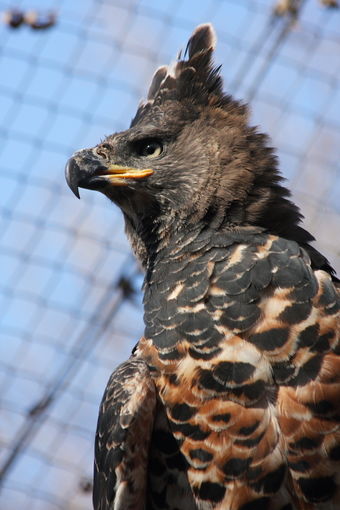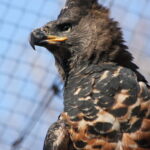Crowned eagles, like other birds of prey, do possess a sense of smell, but it is not their primary sensory modality. These large, powerful raptors rely heavily on their exceptional vision for hunting and other essential tasks. However, recent studies have revealed that many birds, including crowned eagles, have functional olfactory systems that they utilize in various contexts.
The Olfactory Capabilities of Crowned Eagles
While crowned eagles do have a sense of smell, the extent to which they use it for hunting or other behaviors is not entirely clear. Some studies have suggested that birds may employ olfactory cues for communication or camouflage, particularly during the breeding season.
For instance, a study found that the preen oil of incubating birds becomes less odorous during the incubation period, which may help to reduce the olfactory cues at the nest and, consequently, the risk of predation.
The Importance of Vision in Crowned Eagles
Despite their olfactory capabilities, crowned eagles, like other raptors, rely primarily on their exceptional vision for navigating their environment and interacting with other animals. Birds, in general, tend to have a more developed visual system compared to their olfactory system, which is generally not as well-developed as in mammals.
Hunting Strategies of Crowned Eagles
Crowned eagles are known to be skilled hunters, primarily targeting medium-sized mammals such as monkeys. Their hunting strategies involve using their keen eyesight to spot prey from a distance, followed by a powerful and precise strike to capture their target.
Nest Building and Breeding Behaviors
In addition to hunting, crowned eagles also use their visual senses for other essential tasks, such as nest building and breeding behaviors. These birds construct large, sturdy nests high up in the trees, often reusing and maintaining the same nest over multiple breeding seasons.
The Role of Olfaction in Crowned Eagles
While the sense of smell is not the primary sensory modality for crowned eagles, it may play a role in certain behaviors, such as communication and camouflage.
Communication and Olfactory Cues
Some studies have suggested that birds, including raptors, may use olfactory cues for communication, particularly during the breeding season. This could involve the use of pheromones or other scent-based signals to convey information about an individual’s identity, reproductive status, or other important factors.
Camouflage and Olfactory Masking
As mentioned earlier, the reduced odor of incubating birds’ preen oil may help to reduce the risk of predation by masking the olfactory cues at the nest. This suggests that crowned eagles and other birds may use olfactory cues to some extent for camouflage and predator avoidance.
Conclusion
In conclusion, while crowned eagles do possess a sense of smell, it is not their primary sensory modality. These large, powerful raptors rely heavily on their exceptional vision for hunting, navigation, and other essential tasks. However, recent studies have shown that birds, including crowned eagles, may use olfactory cues for communication and camouflage, particularly during the breeding season. The extent to which crowned eagles utilize their sense of smell in various contexts is an area that requires further research.
References:
– Wikipedia – Bird of Prey
– BOU Blog – Bird Odour, Camouflage, and Communication
– Earthlife – Crowned Eagles
– BirdZilla – Can Birds Smell?
– PetHelpful – San Diego Zoo Harpy Eagle


